International Women’s Day (3/23/2024)
Together, the JFCW team celebrated the international women’s day. This is a holiday celebrated annually as a focal point in the women’s rights movement. It gives rise to issues such as gender inequality, reproductive rights, and violence/abuse against women. It started when female textile workers marched in protest of unfair working conditions and unequal rights for women and continues to this day as a global event to celebrate. JFCW held a meeting on March 23rd to honor this day by preparing to make another documentary on international women’s day and women’s rights in general.


Sixth Bianuual Meeting (January 2024)
The JFCW organization held our sixth biannual meeting to discuss the Israel-Hamas War, human rights damaged by war, and relief cases.

Israel-Hamas War:
The Israel-Hamas War dates back to the start of the 20th century. With the Balfour Declaration, Israeli Jews began to take over Palestinian soil, causing the Palestinian Arabs to retaliate. With triggers like the UN Partition Plan, the First and Second Intifada, and the Oslo Accords, the conflict between Israel and Palestine escalated as time passed. This leads to the present, where today, fighting in the Gaza Strip is currently happening between Israel and Hamas.
Human Rights Damaged by War:
JFCW also had the opportunity to explore the different crises throughout the year of 2023. Examining various forms of conflict, the Israel-Hamas war is the most substantial conflict of all. Throughout the year, many instances can be seen where innocent lives have been taken due to conflicts of war. For instance, the United Nations held an honoring from those who were killed in Gaza: Alaa Al Shawa, a nurse; Dr. Mahmoud Abunujaila, general practitioner; Mohammed Al Ahel, a laboratory technician; and Dr. Ahmed Al Sahar, general practitioner.
Relief Cases:
Discussing the topics of war, it is evident that programs for relief must be established and practiced. Currently, many organizations are aiming to help the Israel-Hamas conflict through various methods. Support is being provided to evacuees and residents, awareness about the war is being brought, and volunteers are helping those who require comfort due to the conflict. It is important to stay updated on this event in order to provide assistance to those affected in any way possible.


Girim Day (8/12/2023)


On August 12, 2023, the House of Sharing hosted an ceremony called Girim Day (기림의 날) with the intention of having a memorial for the comfort women. The ceremony began at 10:30 in the morning and the JFCW team arrived as early as 9:00AM to prepare for the opening musical performance.

Prior to the event, the JFCW team rehearsed a total of three songs through out several days. These songs include: The Magic Castle (마법의 성), Tema d’ Amore, and Arirang (아리랑). The ensemble includes Caleb Paik (Alto Saxophone), Hyunseok Lee (Clarinet), Rebekah Lee (Violin), Grace Lee (Flute), and Justin Choi (Cello). With the help of conductor Kyung-ho Ko (고경호), the JFCW team was able to perform successfully.


Lastly, being a significant event, Girim Day was broadcasted live on the Gyeonggi-do youtube channel (경기도청). In it, the members of JFCW can be seen performing on stage for the audience (LINK).

Fifth Biannual Meeting: Comfort Women Art (June 2023)
The JFCW organization held our fifth biannual meeting to discuss the coverage of comfort women in original piece of art: Painting, publications, and animations.
Painting:
A way in which people have opted to inform the world on special topics is through paintings and drawings. The art of drawing has allowed artists to express the true pain and emotion of the womens’ ordeals in a way that video and modern day media cannot. Paintings have also been the primary method for the women themselves to express their emotions, with many of them drawing and showcasing their own work to the public, in hopes of further spreading their message. Renowned painters include the late Kang Duk-kyung and Kim Soon-duk, both of whom were victims of Japanese sexual slavery. They both went through art therapy sessions at The House of Sharing, a nursery home made for comfort women, and created pieces such as “Punish the Guilty” and “Unblossomed Flower”. Visual arts has played a pivotal role within the social activism related to the comfort women tragedy, and has helped solidify the victims’ spots within South Korea’s collective memory – preventing their erasure. The artwork has undoubtedly helped curate a certain ongoing dialogue that anybody can participate in without complication.
Animations:
Fourth Biannual Meeting (January 2023)
The JFCW organization held our fourth biannual meeting to discuss the coverage of comfort women in mainstream media platforms: Theater, movies, and dance.
Movies:
The Japanese ‘comfort women’ tragedy has been publicized through film on countless occasions throughout the years. Many Korean movies have been based on the lives of victims of Japanese sex slavery, though they normally do not explain their stories of abuse in detail, with the whole sex slavery topic being extremely taboo for mainstream media. The movie “I Can Speak” (아이 캔 스피크, 2017) may perhaps be one of the most popular pieces of film exploring the issue. I Can Speak is about an elderly woman who has a negative reputation around her neighborhood for being aggressive and protesting against the local government’s decision to renovate her house and the area surrounding it. She has an undying urge to learn English, and begs a district office worker to be her teacher, but the worker is heavily reluctant to work with such an infamously grouchy person. While it is initially thought that the woman is learning to speak to her long-lost brother in America, it is revealed that the woman was formerly a victim of the Japanese sex slavery tragedy, and is learning to travel to America and speak about her ordeals at a Congressional hearing. The movie is both inspiring and tragic, as the way her truth is revealed highlights the social pressure put upon her to stay silent and the lack of support she received throughout the years. I Can Speak was critically acclaimed upon release, with many lauding the approach the movie had to unveiling the woman’s backstory. Movies such as I Can Speak continue to be released today, further addressing the comfort women tragedy to audiences worldwide.
Dance: JFCW Comfort Women Dance
Third Biannual Meeting (December 2022)
The JFCW organization held our second biannual meeting to discuss the prevalence of comfort women issues all over the world: Berlin, China, and Norway.
Berlin:
The people who suffered from forced prostitution by the Japanese military during World War II were given the name, Comfort Women. These women suffered from horrible conditions such as sexually transmitted diseases. After the war, this incident went unnoticed but as of now, people are starting to use their voices. The reason for the start of World War II was mainly because of Germany. Due to this, much debate has been going around about the Comfort Woman Statue built in Berlin. Many people have differing opinions about whether Comfort Women actually existed or not and surprisingly, the people wanting to discredit the movement of Comfort Women are South Korean officials as they want to improve relationships with Japan. Meanwhile, German citizens want the statue to remain to symbolize peace and a sense of responsibility Germany has for the war. Due to these differences in opinions, there has been a fight over Berlin’s Comfort Woman Statue
China:
Despite the countless horrifying atrocities that were committed during Japanese Imperialism, the victims still have yet to receive an official response and apology from the Japanese government. Yet what most fail to recognize is that Korea isn’t the only country that suffered from detrimental circumstances from Japanese Imperialism, namely the Rape of Nanking/Nanjing Massacre (1937). The Second Sino-Japanese War’s Battle of Nanking was followed by the Imperial Japanese Army’s mass slaughter of Chinese citizens in Nanjing, known as the Nanjing Massacre or the Rape of Nanjing. The slaughter lasted six weeks, starting on December 13th, 1937. Chinese civilians were slain, women were raped, and an unimaginable amount of Chinese property was destroyed or taken by Japanese forces, all in violation of the laws of war. Yet despite such tragic circumstances, government representatives from Japan formally refuted the Nanking Massacre in 1990 by asserting that it was a hoax. The deputy Japanese consul in Houston informed Americans on November 10, 1990, that the massacre did not take place, in accordance with Japanese sources.
Norway:
The victims of sexual slavery from WWII Japanese labor camps are now commonly referred to as ‘comfort women’. A common misconception nowadays is that all ‘comfort women’ are of Korean and Chinese descent. Though a majority of them are indeed Korean and Chinese, it should be known that the origins of ‘comfort women’ ranged from countries all over the world, from neighboring countries such as Korea to even European countries such as Norway. One country with a rather large comfort women population is the Philippines. During the Japanese occupation of the Philippines, many young local women were taken away to camps. According to researcher Evelina Galang, thousands of Filipino women fell victim to the Japanese over the course of three years. Unfortunately, Filipino comfort women, now mostly in their 80s and 90s, have not been able to receive any sort of compensation or care, as is the case for many other countries. It is imperative that thousands of women not only in the Philippines but all over the world, get their long-overdue apologies and compensation.
Second Biannual Meeting (July 2022)
The JFCW organization also held a biannual meeting to discuss and answer the following three questions: Who/What are Comfort Women?, Japan’s response towards comfort women, and Korea’s countermeasures and responses.
Who/What are Comfort Women?
The people who suffered from forced prostitution by the Japanese military during World War II were given the name, Comfort Women. These women suffered from horrible conditions such as sexually transmitted diseases. After the war, this incident went unnoticed but as of now, people started using their voices.
-Japan’s failure to acknowledge the “comfort women” tragedy-
Though it has been over 70 years, the “comfort women” of South Korea have yet to receive proper atonement from the Japanese government. Talks have been held, and two official apologies have been issued by the Japanese, but it is without a doubt that none of the meet the criteria for an acceptable apology.
-Korea’s countermeasures/response-
Korea is mainly seeking for compensation and an apology other than mere money. While Japan was suggesting for the distortion of history for the sake of Capital, Korea is asking for a proper apology that embraces and accepts history rather than neglecting it. Furthermore, Korea has been actively attempting to remember comfort women issues through protests, movies, or documentaries regarding Japanese colonization and their war crimes.
On the eve of Liberation Day on August 14th, the 10th anniversary of “Girim Day” was held at the house of sharing. The house of sharing was filled with news reporters and politicians advocating for the remembrance of comfort women. The event also hosted a performance team for the halmonies. We were also given the opportunity from the ‘House of Sharing’ to perform a musical concert too.
Thrilled but also nervous, we performed our hard-prepared concert. Although the event was extremely lighthearted and delightful, it was also a clear wake-up call to never forget the physical and mental distress comfort women had to go through on a daily basis.
Our JFCW club prepared a small concert with about a month of preparation. Previous alumni of the organization who are currently attending college also came to partake and assist us in the concert.
We played canon and Arirang, songs requested by the halmonis. We had a great time singing and dancing together. We were extremely delighted to see the halmonis enjoying the concert and asking us to visit often.
Temporarily closed due to covid and other issues,
The House of Sharing’s ‘History Hall’ section is currently under construction. However, it is expected to reopen during mid-July. As the History Hall section provides a detailed and accurate representation of the lives of comfort women, we had the opportunity to learn more in-depth about the heinous, unforgivable, and frightening behavior of the Japanese soldiers back in the 1950s.
The following photos display Japanese soldiers waiting in front of the “comfort station”
and, a picture of a comfort women being dragged away mercilessly.
Despite vivid evidence and photos like the following, we cannot understand why some Japanese political parties refuse to acknowledge the truth.
Temporarily closed due to covid-19, we visited the House of Sharing after a long break. Before we visited the House of Sharing, we bought everyday items and food to aid the comfort women. We were welcomed with open arms. We were also given the opportunity to listen to the victims’ stories. It was truly a pleasure to spend time with the members of the House of Sharing.
The End of the Tunnel, or translated from Korean, “the Grandmothers’ Tomorrow”, is an art gallery, hosting the many photos of the current lives of the comfort women, and memorials of the late women. The gallery shines a light on how comfort women are now leading a better life, and how they deserve a better future. The issue of comfort women must be addressed in international society, but promising a bright future for the victims is also a priority. Nowadays, the women live happily, in the “House of Caring,” or “나눔의 집” in Korean.

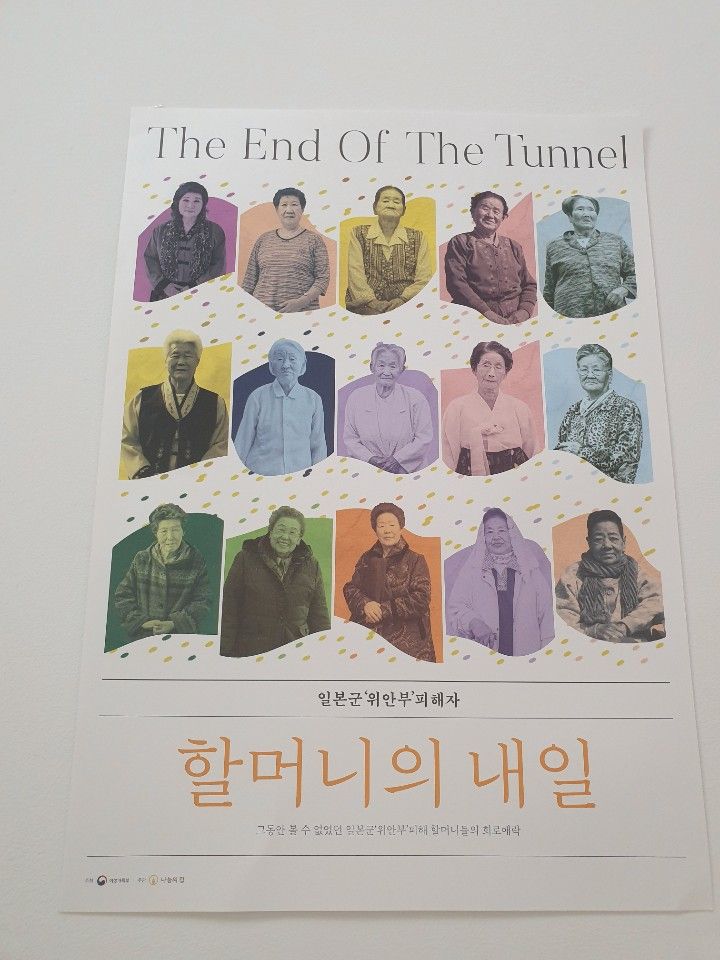



On the last note, the interviews below are our final thoughts on what we experienced visiting this gallery.
_________________________________________________________________________________
Jessie Jeong-yeon Park wrote a children’s storybook on a comfort woman issue to help children understand and remember there had been a tragic history regarding a human-right-issue during the World War 2.



Justice for Comfort Women member, Jessie Jeong-yeon Park visited the House of Sharing and spent time with the surviving comfort women.
From the House of Sharing, Mr.Shin-kwon Ahn & a surviving comfort woman, Il-chool Kang met with the Congress woman, Grace Meng & the Congressman, Charles Levine of New York, presenting the book, ‘Touch-Me-Nots’.



Justice for Comfort Women Club has been sending out the book, ‘Touch-Me-Not’ to the public schools, politicians & intellectual communities in the U.S. and other countries to raise the awareness on the comfort women issue.
California Congressman, Mr. Mike Honda endorses the book.


Sponsored by the Ministry of Gender Equality & Family and Victim’s Human Rights Commission of Korea, Justice for Comfort Women published the book, ‘Touch-Me-Nots’ with the House of Sharing.
The book, ‘Touch-Me-Not’ will be delivered to schools and human rights institutions so that surviving comfort women can be able to share their true painful stories and get proper apology from the Japanese government who still denies the history.


Justice for Comfort Women members visits ‘House of Sharing’ regularly, doing the best to help and attend the survivors from the history..


Justice for Comfort Women Club has been awarded as Distinguished State Honoree at The Prudential Spirit of Community Awards 2015 for club’s endeavor to spread ‘Comfort Women issues’ over the world.

Justice for Comfort Women’s activity was recognized by the nation’s biggest leading English Newspaper, ‘The Korea Times’.
http://koreatimes.co.kr/www/news/people/2014/09/178_164469.html
My name is ‘Kim Bok-soon’ dance performance at the National Theater in Seoul, S.Korea






‘Justice for comfort women’ members actively promoted the dance performance of ‘My name is Kim Bok-soon’, the story of a comfort woman, by raising money for the ticket purchases. Also, during the performance day, the members exhibited the ‘comfort women’ themed paintings at the lobby of the National theater to promote awareness for the comfort women issue to the general public.

at the KEPCO Art center


of war survivors, victims and related stories.
‘Justice for Comfort women’ members are the Boards and staff members of a volunteering organization, ‘Art & Love’. ‘Art & Love’ had an exhibition of its 143 members to promote the awareness of reality of a war and its victims & survivors.

Comfort Women then & now
Members (Dongho Kim & Alberta Yoo) presented the comfort women issue at the 2nd W-WSN Conference.



‘Justice for Comfort Women’ members donated art talents to help out the WTIT( World Transfer of Information & Technology) charity fund raising events to help out the lesser fortunate community in South East Asia.



‘The House of Sharing’ and ‘Justice of Comfort Women’ connected as one to promote the issue of comfort women before it is too late.


Every Wednesday, a rally is held for an hour in front of the Japanese Embassy in Seoul, asking for the recognizing the rights of comfort women.

Sold by the members.
Members sold awareness bracelets to raise funds.


























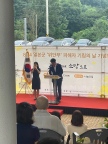


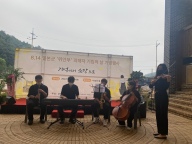




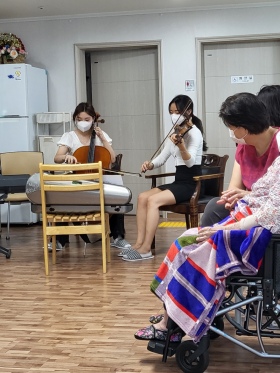



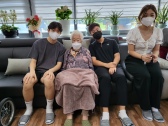


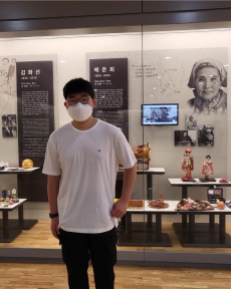










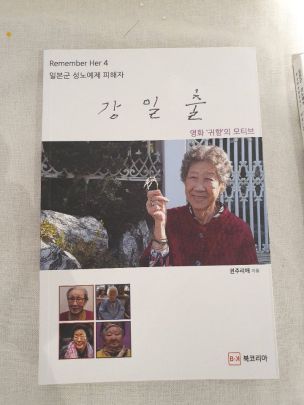



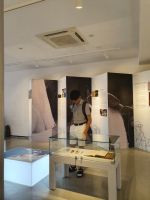














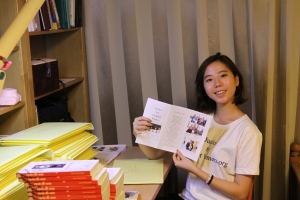























When will “Touch Me Nots & “Her Tears” be available from Amazon?
I want to get them for my son.
Thank you for your comment.
If you leave your address on our e-mail : justiceforcomfortwomen2014@gmail.com
Then, we will send you the books. ‘Her Tears’ is currently available through only Korean bookstores off & on-line. ‘Touch-Me-Nots’ is published under the fund from the Ministry of Family & Gender Equality, and not yet commercially available.
Great!